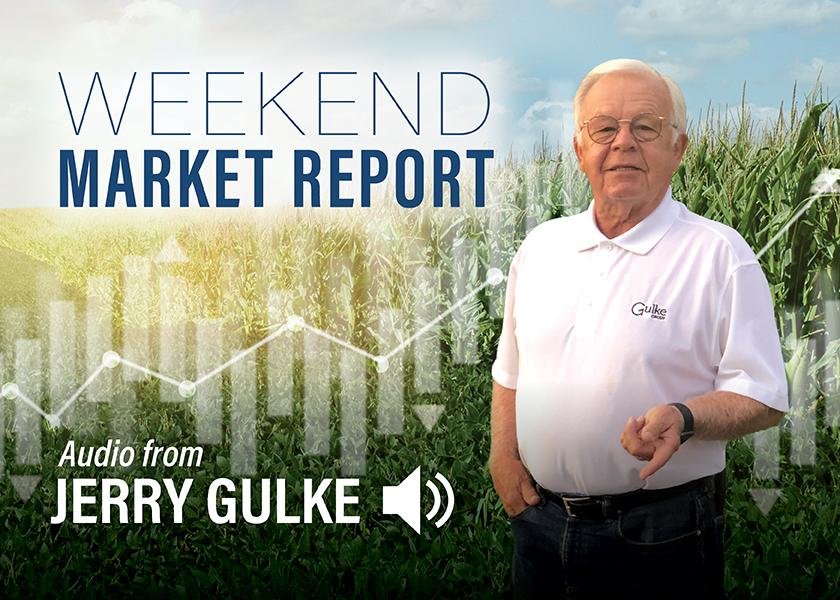Jerry Gulke: Will Governments Interfere with Price Volatility?

The grain markets are playing a familiar tune—a song of higher prices.
May corn was up 12¢ and December corn prices were up 23¢, for the week ending March 25. The entire soybean complex was up this week, with May soybean prices were up 41¢. All of the wheat contracts were up this week by 40¢ or more. Hog prices, fuel prices and the dollar were all also up for the week.
“We are truly in uncharted waters,” says Jerry Gulke, president of the Gulke Group. “We’ve never been here before. There are so many things in motion.”
Once again, he says, old-crop corn and soybean prices for the week are higher than new-crop prices. May corn prices closed the week at $7.54 per bushel.
“We've been near $8 before,” Gulke says. there before. “In the past we curbed demand at that level. We also brought in new competitors of Ukraine and Russia, because then anybody can grow $7 or $8 corn.” Input costs are far different today.
Now it’s those countries could be absent from the market again, he notes.
“When we look back at these times, we may see it as when we never viewed Russia as the same again,” Gulke says. “The poorer nations are being hurt as they can’t afford high-priced food. We are now hearing today’s situation being called a crisis.”
Gulke says his concern is governments across the globe could start to become more involved in global agriculture, as a way to cope with high prices.
“What we thought was high prices now, however, may become low prices in order to sustain the supply of food at least for the next one or two or three years,” he says.
President Biden on Thursday warned of global food shortages as a result of the Russian invasion of Ukraine — predicting that the war would upend global wheat supplies, according to the New York Post. Biden said that the U.S. and Canada will seek to boost wheat production to offset the drop in supplies.
“They said we've got to incentivize the maximum production of agriculture in all the countries of in the world in order to ensure an adequate food supply,” Gulke says. “There's been talk about opening up the CRP. If they are going to do it, they better do it fast, if only to appease the livestock lobby.” Odds are doing so would viewed as political interference with the marketplace, however it was done before under perhaps less dire situation.
In addition, Gulke says, there is pressure to eliminate the mandate for biofuels and “not burn food for fuel.”
Read More: Technical Analysis and Price Charts from Jerry Gulke to Navigate Uncharted Waters
Prospective Plantings On Deck
On Thursday, March 31, USDA will release its Prospective Plantings and Grain Stocks report.
“I think the report next week could be bullish regardless of what it says,” Gulke says. "The only one caveat out there is one firm has been predicting 5 million acres increase in soybeans. If 5 million more acres come in, they probably wouldn’t be high-quality acres.”
Even with a jump in U.S. soybean acres, South America has lost more than 1 billion bushels of soybean production between Brazil and Argentina.
“If you increase 1 million acres, that’s about 50 million bushels of soybeans,” he says. “But if you increase 1 bu. per acre, that's about 89 million bushels. So, it will be really important we get a good yield on all the acres we plant.”
Expect volatile markets the minute the reports are issued, Gulke says.
After next week’s report, Gulke will have his eye on the May Crop Production report.
“In May I’ll be looking for any signs that this party is over in prices,” he says.
Read More: Technical Analysis and Price Charts from Jerry Gulke to Navigate Uncharted Waters
Check the latest market prices in AgWeb's Commodity Markets Center.
Get in Touch with Jerry
Do you have questions for Jerry? Contact him at info@gulkegroup.com or 312-896-2090 or GulkeGroup.com
Jerry Gulke farms in Illinois and North Dakota. He is president of Gulke Group Advisory Services. Disclaimer: There is substantial risk of loss in trading futures or options, and each investor and trader must consider whether this is a suitable investment. There is no guarantee the advice we give will result in profitable trades. Past performance is not indicative of future results.







